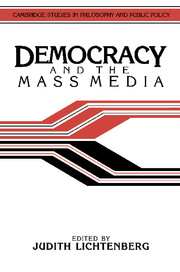Book contents
- Frontmatter
- Contents
- Preface
- List of contributors
- Introduction
- 1 Liberal constraints on private power?: reflections on the origins and rationale of access regulation
- 2 Liberalism and free speech
- 3 Foundations and limits of freedom of the press
- 4 Why the state?
- 5 Practices of toleration
- 6 Access in a post–social responsibility age
- 7 Who decides?
- 8 Four criticisms of press ethics
- 9 Political communication systems and democratic values
- 10 Mass communications policy: where we are and where we should be going
- 11 Content regulation reconsidered
- 12 The rationale of public regulation of the media
- 13 The role of a free press in strengthening democracy
- Index
9 - Political communication systems and democratic values
Published online by Cambridge University Press: 05 June 2012
- Frontmatter
- Contents
- Preface
- List of contributors
- Introduction
- 1 Liberal constraints on private power?: reflections on the origins and rationale of access regulation
- 2 Liberalism and free speech
- 3 Foundations and limits of freedom of the press
- 4 Why the state?
- 5 Practices of toleration
- 6 Access in a post–social responsibility age
- 7 Who decides?
- 8 Four criticisms of press ethics
- 9 Political communication systems and democratic values
- 10 Mass communications policy: where we are and where we should be going
- 11 Content regulation reconsidered
- 12 The rationale of public regulation of the media
- 13 The role of a free press in strengthening democracy
- Index
Summary
The American media system is presumably animated by certain democratic principles. Some of these concern the relationship of the mass media to government – for example, the proposition that, acting on behalf of the citizenry, the media should guard against abuses of power by officeholders. Others concern the relationship of the mass media to diverse opinion sources – for example, the proposition that the media should provide a robust, uninhibited, and wide-open marketplace of ideas, in which opposing views may meet, contend, and take each other's measure. Yet others concern the relationship of the mass media to the public at large – for example, the propositions that they should serve the public's “right to know” and offer options for meaningful political choices and nourishment for effective participation in civic affairs.
Yet, a glance at the world of the American media today reveals a landscape dominated by a few giant media corporations. These enterprises may be as remote from the people as are other powerful and dominant institutions in society. Their inner workings are rarely opened to voluntary outside scrutiny. And they seem committed to the presentation, not of a broad spectrum of ideas but of mainstream opinion currents, whose flows are bounded politically by the two-party system, economically by the imperatives of private enterprise capitalism, and culturally by the values of a consumer society.
This essay deals with the tensions and disparities between the ostensibly democratic ideals that the mass media are supposed to serve and the communication structures and practices that actually prevail.
- Type
- Chapter
- Information
- Democracy and the Mass MediaA Collection of Essays, pp. 269 - 289Publisher: Cambridge University PressPrint publication year: 1990
- 81
- Cited by

